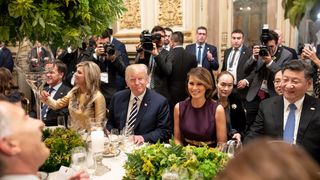President Trump has every reason to want a resolution to the trade war with China. But the chance of striking a deal by Christmas is more remote than ever.
Beijing will not come to the negotiating table without leverage, and nor can it afford to: facing a protracted challenge in Hong Kong, the regime risks losing face if it is seen to capitulate to Western demands. Despite its own domestic concerns, China has three important levers it can use to dial up the pressure on the US economy.
Currency
Beijing’s decision to devalue the yuan makes Chinese goods more competitive but this was not the primary motivation for devaluation. After all, Beijing’s interests are best served by avoiding large drops in its currency to prevent capital flight. In any case, with slowing growth in China, some devaluation was necessary to allow the yuan to fall to a level closer to its market rate. Devaluing below the psychologically important seven yuan per US dollar threshold was primarily a signalling strategy; a sign that China would not roll over and accede to US negotiators’ demands.
A stranglehold on rare earth metals
The second tool in China’s arsenal is its 80 per cent global market share in production and processing of rare earth oxides. China’s threats to halt these exports to the US are a dire prospect for the consumer electronics and defence industries, where rare earth minerals are an essential input. As the second-largest source of rare earths, Australia stands to gain as markets seek alternative suppliers, but whether its industrial base can make up the shortfall remains to be seen.
A clear shot at Trump’s base
Thirdly, for agricultural goods such as grain, soybeans and beef, China can and has exercised leverage over the US by substituting away from American suppliers, especially when other high-quality producers like Australia are available. When it comes to these exports to China, the US is Australia’s biggest competitor, so in the short-term Australian farmers are net beneficiaries of the trade war. But the limitations to this became apparent when China doubled tariffs on Australian beef, after surging demand saw producers exceed the 2019 quota negotiated under the Australia-China Free Trade Agreement.
And then there are the US' own problems
Like China, the US has its fair share of domestic challenges to contend with, which only raises the stakes. So far, Trump has won his base’s acquiescence with his personal brand. Since the 1980s, Trump has centred on getting tough on trade partners where the United States seemingly gets a raw deal. Farmers – and by extension, the members of Congress that represent them – are willing to withstand short-term economic pain caused by the trade war because they believe in the president’s long-term goals. This is borne out in polling data from July, which showed Trump’s approval rating among farmers at an all-time high of 78 per cent.
Even after China’s tit-for-tat decision to halt US agriculture purchases this month, frustration was directed towards the Washington establishment, rather than the President. And renewed pressure on Trump from world leaders at the G7 and central bankers at Jackson Hole to de-escalate the trade war only strengthens his base’s resolve.
Trump’s recent decision to hit pause on part of the next round of tariffs until after the holiday retail season reveals his finely tuned political instincts: there are limits to what American voters will put up with.
Whether this patriotic spirit can survive an economic downturn is crucial. Trump’s recent decision to hit pause on part of the next round of tariffs until after the holiday retail season reveals his finely tuned political instincts: there are limits to what American voters will put up with. After all, even for the self-proclaimed ‘Tariff Man’, duties are a means to an end. Staring down the barrel of a general election in November 2020, the pressure is on the dealmaker-in-chief to make good on his promise to strike a trade deal with China that achieves key structural reforms.
President Trump will also be keen to avoid a recession in an election year. Recent share market volatility, weakness across major indicators like the US manufacturing Purchasing Managers’ Index (PMI) – which fell to its lowest level since the depths of the GFC in July – and the Cass Freight Shipments index as well as the Fed’s decision to cut rates, the second inversion of the three month-ten year Treasury yield curve in six months, have many economic commentators turning bearish.
Additionally, blowback from US companies after Trump threatened to invoke the International Emergency Economic Powers Act of 1977 to force them to leave China, endangers the economic narrative Trump would want underpin his re-election campaign. The President enters the race having presided over a domestic economic revival and a strong job market – a fact that would normally assure re-election – but his trade policy and these concerning signs dampen voters’ confidence.The trade war’s impact has not been confined to the US: last month’s reporting season has seen many ASX200 executives echo the RBA, citing US-China trade tensions as a major cause for concern. And that doesn’t begin to account for the many small businesses that are acutely trade exposed with less wherewithal to weather the storm.
We’ve seen how easily economic contagion can overwhelm an open trading system. Now more than ever, the global economy needs less bravado and brinkmanship from its two largest players.






